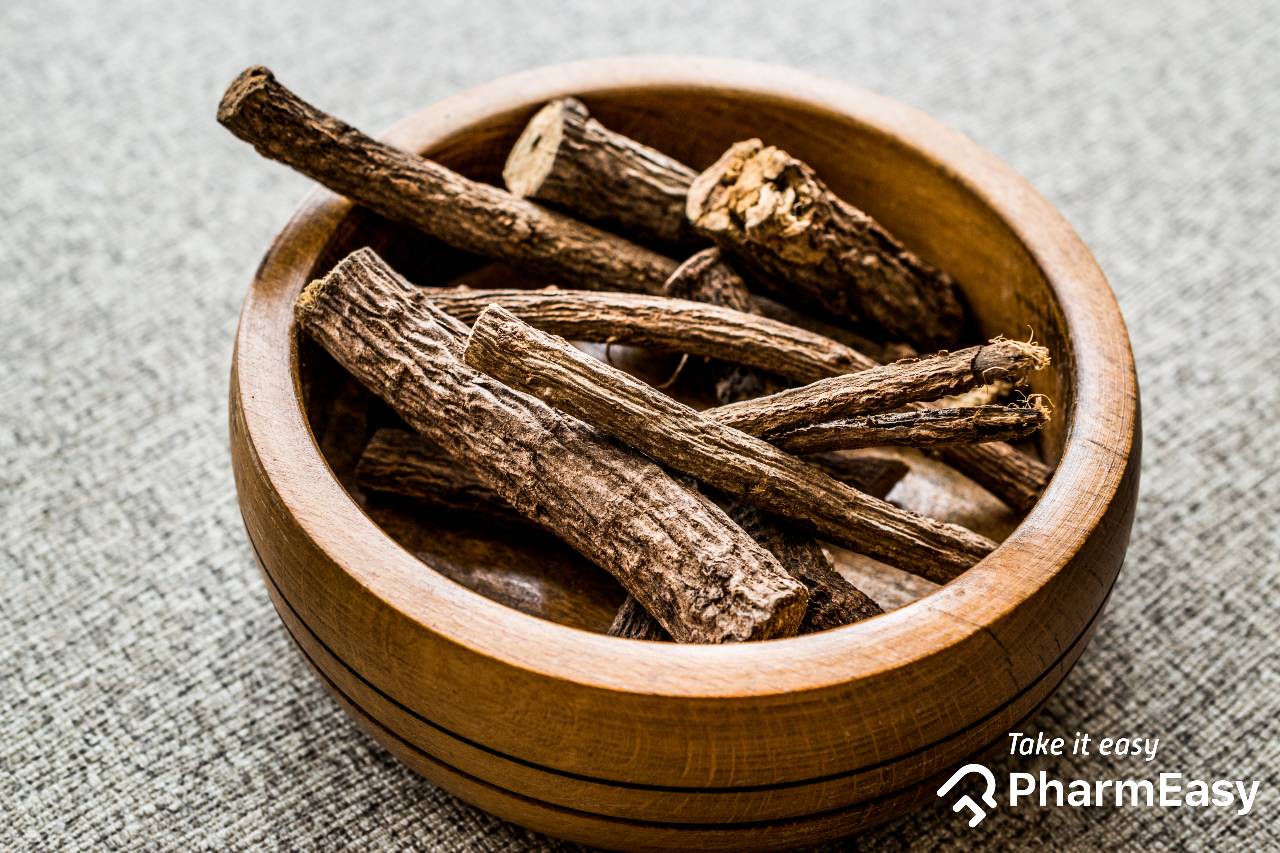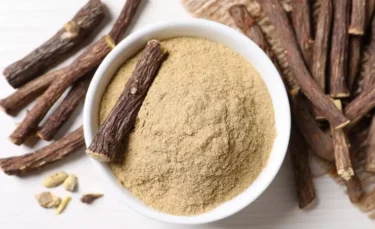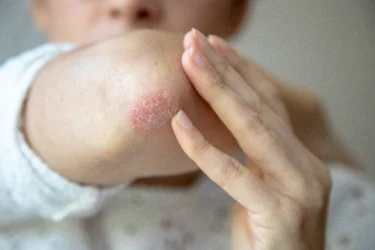Licorice (Mulethi): Uses, Benefits, Side Effects, and More!
By Dr Ashok Pal +2 more

Get,

to manage your symptom
Get your,


4 Cr+ families
benefitted

OTP sent to 9988776655



You’ve successfully subscribed to receive
doctor-approved tips on
Whatsapp

Get ready to feel your best.

Hi There,
Download the PharmEasy App now!!


Register to Avail the Offer
Send OTPBy continuing, you agree with our Privacy Policy and Terms and Conditions

Hi There,
Sign up on PharmEasy now!!
Trusted by 4 crore+ families

OTP sent to 9988776655



You have unlocked 25% off on medicines




Code: NU25
By Dr Ashok Pal +2 more
Table of Contents
Licorice, scientifically known as Glycyrrhiza glabra, is one of the most popular medicinal plants belonging to the Fabaceae family1. It is a perennial herb grown in temperate zones. The plant parts used are runners and roots, which are collected in the fall season. The medicinal use of licorice in western and eastern cultures dates back thousands of years, it is also one of the most common ingredients in Chinese medicine2. The name Glycyrrhiza is derived from the Greek terms ‘glykos’, meaning sweet, and ‘rhiza’, meaning root. It is native to the Mediterranean region and grown in India, China, Spain, Iran, Russia and Italy3. Licorice is also known as, Jothi-madh and Mulaithi (Hindi), Licorice, Liqourices, and Sweet wood (English), and Licorice, Liqourices, and Sweet wood (Sanskrit).

Did you know?
Licorice is the source of polysaccharides, simple sugars, proteins, amino acids, and mineral salts like calcium, sodium, potassium, iron, zinc, copper, phosphorous, magnesium, manganese, silicon, and selenium. It also contains vitamins like B1, B2, B3, B5, E and C. Pectins, starches, resins, and gums1.
The chief constituent of the roots is glycyrrhizin, a triterpenoid saponins 50 times sweeter than sucrose1.
I have great news for those suffering from indigestion problems! A study6 found that the root extract of licorice might be a natural and effective remedy for indigestion. It may reduce symptoms, improves individual discomforts, and boosts quality of life.
Dr. Siddharth Gupta, B.A.M.S, M.D (Ayu)
The properties of licorice are given as follows.
Due to its antibacterial and anti-inflammatory properties, there are many potential mulethi benefits and uses associated with licorice root extract4. Potential uses of licorice against some health conditions are given below.

The potential use of licorice in different cancers has been observed in lab-scale studies. However, more research is required to support the use of licorice against human cancer. Therefore, you are advised to strictly adhere to the doctor’s advice and treatment.
I would suggest licorice if you’re looking for a natural solution to keep your pearly whites healthy! It may have some incredible benefits for your oral and dental health. Yep, it’s true! Studies7 have shown that licorice and its powerful components are super effective against common oral problems such as cavities and gum diseases.
Dr. Rajeev Singh, BAMS

Oxidative stress and chronic inflammation are causes of chronic obstructive pulmonary disease. ISL has shown anti-inflammatory and antioxidant properties, due to which it was able to reduce the inflammatory cells in an animal study4. Licorice might be explored as a potential remedy for obstructive respiratory diseases. However, if you experience any respiratory problems, you must contact your healthcare provider immediately.

Glycyrrhizin, found in licorice root has shown liver-protective potential in viral hepatitis. Japan and China have developed glycyrrhizin as a liver protective medicine. The anti-inflammatory and antiapoptotic properties of glycyrrhetinic acid, a compound found in licorice, may provide liver-protective benefits4. However, if you are suffering from liver problems, reach out to your healthcare provider immediately and get a proper diagnosis.
I came across a study8 that showed the protective effects of licorice extract in the kidneys of diabetic rats. It suggested that it may help improve blood glucose levels and reduce kidney damage. Although licorice extract may be a natural super-hero for diabetes and kidney health, its effects on humans still need to be investigated.
Dr. Smita Barode, B.A.M.S, M.S.

Many laboratory studies4 suggest that licorice extract might be a potential agent against bacterial infection. During trials, licorice extract has shown promising results against Candida albicans and Staphylococcus aureus infections. However, infections require a medical diagnosis and treatment. If you experience any signs of infection, contact your healthcare provider before using licorice.
In my opinion, licorice root extract might just be your secret weapon against hot flashes. Licorice root extract shows promise for ladies going through menopause. It might act as a natural remedy for managing hot flashes9.
Dr. Anuja Bodhare, B.A.M.S, M.D (Ayu)

Inflammatory illnesses are becoming common and have a significant impact on daily life. Flavonoids found in licorice may be used as a potential medication for inflammation. Licorice extract has anti-inflammatory properties in managing various diseases, like acute kidney disease. ISL has shown anti-inflammatory activities in kidneys4. More research is needed to support the use of licorice in inflammatory conditions in humans. Therefore, talk to your healthcare provider and get a proper diagnosis.

Though there are studies showing the benefits of licorice in various conditions, these are insufficient and there is a need for further studies to establish the true extent of the benefits of licorice on human health.
Also Read: Lemongrass: Uses, Benefits, Side Effects and More!
Roots and rhizomes of licorice can be used in the form of:
Your Ayurvedic physician will prescribe the form and dose as per your requirement.
You must consult a qualified doctor before taking licorice or any herbal supplements. Likewise, do not discontinue or replace an ongoing treatment of modern medicine with an ayurvedic/herbal preparation without consulting a qualified doctor.
Also Read: Shilajit: Uses, Benefits & Side Effects
Licorice is the word for mulethi in English. Potential mulethi side effects are shared below.
Before using licorice or any herbal remedy, you are advised to talk to your healthcare provider about the possible side effects associated with its use. It will help you avoid side effects.
Here are some general precautions you need to take with licorice.
Also, before using licorice for any health condition, you are advised to consult your doctor about the possible precautions associated with licorice.
Licorice root extract inhibits a major human drug-metabolising enzyme called the P450 enzyme. Therefore, it may increase the effects of drugs metabolised by the P450 enzyme2.
Also, if you are taking medicines for any health conditions, make sure you talk to your healthcare provider about the possible interactions of the drug with other herbs and medications.
Also Read: Pashanbhed (Bergenia Ligulata): Uses, Benefits, Side Effects & More!
The plant Glycyrrhiza glabra is commonly known as licorice. It belongs to the Fabaceae family. It is a medicinal plant3.
Licorice is called Atimaduram in Tamil3.
Licorice use should be avoided during pregnancy due to insufficient data available regarding its safe use5. Consult your healthcare provider before using any herbal remedy.
Licorice root is used as a flavouring agent for chewing gums, candies, baked goods, ice creams, and even soft drinks. The use of licorice extract and glycyrrhizin in foods has been approved by the United States Food and Drug Association, the Council of Europe, and the joint FAO/WHO Expert Committee on Food Additives1.
Glycyrrhetinic acid may help manage eczema, contact and allergic dermatitis, and psoriasis. In addition, Glabrene and isoliquiritigenin found in licorice might be helpful in skin disorders like melasma and age spots that arise due to the accumulation of melanin. Glabrene and isoliquiritigenin may also be useful skin-lightening agents2. However, before using any herb on your face or skin, you are advised to talk to your skin doctor.
Licorice might be used as a demulcent for sore throat. Licorice powder, as well as extract, may be used for managing sore throat3. However, if your symptoms don’t improve, talk to your healthcare provider.
Glycyrrhizin, the main constituent of licorice root, is 50 times sweeter than sucrose. Therefore, it can be used as a sweetener1.
1. Pastorino G, Cornara L, Soares S, Rodrigues F, Oliveira MBPP. Liquorice (Glycyrrhiza glabra): A phytochemical and pharmacological review. Phytotherapy Research [Internet]. 2018 Dec 1 [cited 2022 Mar 15];32(12):2323. Available from: https://pubmed.ncbi.nlm.nih.gov/30117204/
2. Murray MT. Glycyrrhiza glabra (Licorice). Textbook of Natural Medicine [Internet]. 2020 [cited 2022 Mar 15];641. Available from: https://www.ncbi.nlm.nih.gov/pmc/articles/PMC7348626/
3. Sharma V, Katiyar A, Agrawal RC. Glycyrrhiza glabra: Chemistry and Pharmacological Activity. Sweeteners [Internet]. 2018 [cited 2022 Mar 15];87. Available from: https://pmc.ncbi.nlm.nih.gov/articles/PMC7124151/
4. Wahab S, Annadurai S, Abullais SS, Das G, Ahmad W, Ahmad MF, et al. Glycyrrhiza glabra (Licorice): A Comprehensive Review on Its Phytochemistry, Biological Activities, Clinical Evidence and Toxicology. Plants (Basel, Switzerland) [Internet]. 2021 Dec 1 [cited 2022 Mar 15];10(12). Available from: https://pubmed.ncbi.nlm.nih.gov/34961221/
5. Licorice Root – Health Encyclopedia – University of Rochester Medical Center [Internet]. [cited 2022 Mar 15]. Available from: https://www.urmc.rochester.edu/encyclopedia/content?contenttypeid=19&contentid=licorice
6. Raveendra KR, Jayachandra, Srinivasa V, Sushma KR, Allan JJ, Goudar KS, Shivaprasad HN, Venkateshwarlu K, Geetharani P, Sushma G, Agarwal A. An Extract of Glycyrrhiza glabra (GutGard) Alleviates Symptoms of Functional Dyspepsia: A Randomized, Double-Blind, Placebo-Controlled Study. Evid Based Complement Alternat Med. 2012;2012:216970. doi: 10.1155/2012/216970. Epub 2011 Jun 16. PMID: 21747893; PMCID: PMC3123991. Available from: https://pmc.ncbi.nlm.nih.gov/articles/PMC3123991/
7. Shaikh S, Kumar SM. Beneficial effects of specific natural substances on oral health. Saudi Med J. 2017 Dec;38(12):1181-1189. doi: 10.15537/smj.2017.12.20516. PMID: 29209665; PMCID: PMC5787627. Available from: https://pmc.ncbi.nlm.nih.gov/articles/PMC5787627/
8. Kataya HH, Hamza AA, Ramadan GA, Khasawneh MA. Effect of licorice extract on the complications of diabetes nephropathy in rats. Drug Chem Toxicol. 2011 Apr;34(2):101-8. doi: 10.3109/01480545.2010.510524. PMID: 21314459. Available from: https://pubmed.ncbi.nlm.nih.gov/21314459/
9. Nahidi F, Zare E, Mojab F, Alavi-Majd H. Effects of licorice on relief and recurrence of menopausal hot flashes. Iran J Pharm Res. 2012 Spring;11(2):541-8. PMID: 24250477; PMCID: PMC3832176. Availlable from: https://pmc.ncbi.nlm.nih.gov/articles/PMC3832176/
Disclaimer: The information provided here is for educational/awareness purposes only and is not intended to be a substitute for medical treatment by a healthcare professional and should not be relied upon to diagnose or treat any medical condition. The reader should consult a registered medical practitioner to determine the appropriateness of the information and before consuming any medication. PharmEasy does not provide any guarantee or warranty (express or implied) regarding the accuracy, adequacy, completeness, legality, reliability or usefulness of the information; and disclaims any liability arising thereof.
Links and product recommendations in the information provided here are advertisements of third-party products available on the website. PharmEasy does not make any representation on the accuracy or suitability of such products/services. Advertisements do not influence the editorial decisions or content. The information in this blog is subject to change without notice. The authors and administrators reserve the right to modify, add, or remove content without notification. It is your responsibility to review this disclaimer regularly for any changes.
Comments

Leave your comment...
You may also like
Comments